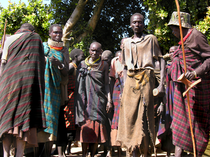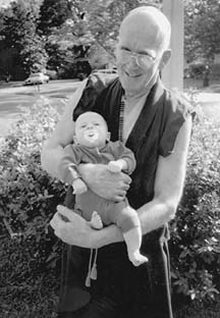
Colin Macmillan Turnbull was a British-American anthropologist who came to public attention with the popular books The Forest People and The Mountain People, and one of the first anthropologists to work in the field of ethnomusicology.

The National Film Board of Canada is Canada's public film and digital media producer and distributor. An agency of the Government of Canada, the NFB produces and distributes documentary films, animation, web documentaries, and alternative dramas. In total, the NFB has produced over 13,000 productions since its inception, which have won over 5,000 awards. The NFB reports to the Parliament of Canada through the Minister of Canadian Heritage. It has bilingual production programs and branches in English and French, including multicultural-related documentaries.

Dark Days is an American documentary film directed, produced, and photographed by the English documentarian Marc Singer that was completed and released in 2000. Shot during the mid-1990s, it follows a group of people who lived in the Freedom Tunnel section of the Amtrak system at the time. DJ Shadow created new music for the documentary and also let Singer use some of his preexisting songs.

The Ik people are a rapidly-evolving ethnic group of about 10,000 people in the mountains of north-east Uganda near the border with Kenya. According to claims circulated to Western aid communities by savvy tribe members, 'the Ik were displaced from their ancestral lands to create the Kidepo Valley National Park, then suffered extreme famine'. Other rumors claim their weakness relative to other tribes means they are regularly raided to kidnap females to be mis-used as slaves.
Colin Higgins was an Australian-American screenwriter, actor, director, and producer. He was best known for writing the screenplay for the 1971 film Harold and Maude, and for directing the films Foul Play (1978) and 9 to 5 (1980).
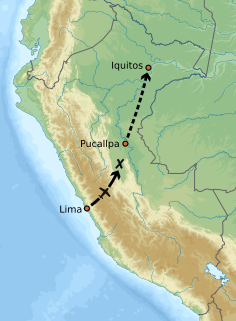
LANSA Flight 508 was a Lockheed L-188A Electra turboprop, registered OB-R-941, operated as a scheduled domestic passenger flight by Lineas Aéreas Nacionales Sociedad Anonima (LANSA), which crashed in a thunderstorm en route from Lima to Pucallpa, Peru, on December 24, 1971, killing 91 people–all six of its crew and 85 of its 86 passengers. It is the deadliest lightning strike disaster in history.
Jean-Pierre Hallet was a Belgian ethnologist, naturalist, and humanitarian known best for his extensive work with the Efé (Bambuti) pygmies of the Ituri Rainforest. He wrote the 1964 autobiographical book, Congo Kitabu, the 1973 ethnologic book Pygmy Kitabu, and the 1968 book Animal Kitabu, which details his extraordinary collection of animals in the Congo and in Kenya. He initiated the Pygmy Fund for the benefit of the Efé.

Cevin Soling is an American writer, filmmaker, philosopher, musician, music producer, and artist.
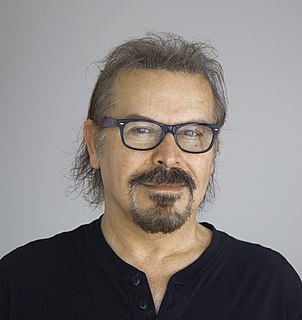
Jano Rosebiani is an Iraqi-Kurdish American filmmaker. He is the winner of numerous international awards and has been listed in the top 35 world filmmakers in the book "Cineaste Uit De Schaduw" by Belgian celebrity photographer Kris De Witte.
Joseph Towles was an African American anthropologist and author of the books Nkumbi Initiation and Asa: Myth of Origin of the Blood Brotherhood Among the Mbo of the Ituri Forest. Towles was born in Senora, Virginia, to Arcellius Towles and Lucy Blair and was raised in Virginia before moving to New York City to pursue acting. He graduated with an undergraduate degree in anthropology from Pace University, and received a Ph.D. from Makerere University in Uganda.
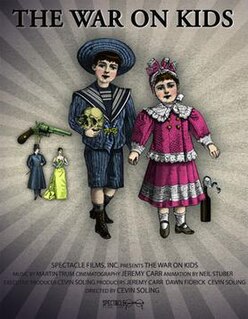
The War on Kids is a 2009 documentary film about the American school system directed by Cevin Soling. The film examines American public education and argues that many public school systems are not only failing to educate, but are increasingly authoritarian institutions that are eroding the foundations of American democracy.

Christopher Senyonjo is a clergyman and campaigner for LGBT rights in Uganda. He was elevated to bishop in the Church of Uganda in 1974 and retired in 1998. In 2001, he was barred from performing services. Whilst it is widely claimed that this is because of his stance on gay rights, the church claims that it was because of his participation in the consecration of a man to be a bishop of a church with which the Church of Uganda is not in communion. He has since worked with the Charismatic Church of Uganda and the progressive Episcopal Church of the United States, and founded Integrity Uganda and the Saint Paul's Reconciliation and Equality Centre in Kampala. In 2006 the Church of Uganda declared him "no longer a bishop" and revoked all remaining privileges for his involvement with the Charismatic denomination. For his stance Senyonjo has received several honours including the Clinton Global Citizen Award, and has been invited to participate in documentaries and international speaking tours.
Janks Morton, Jr., is an American filmmaker, author, activist, director, producer, editor, and cinematographer. Morton currently lives in Atlanta, Georgia.

Men of the Lightship is a short propaganda film produced by the Crown Film Unit for the British Ministry of Information in 1940, the year after the beginning of the Second World War. It dramatises the bombing of the East Dudgeon lightship by the Luftwaffe on 29 January 1940 and was designed to portray Germany as a barbaric enemy. An opening narration explains the traditional understanding of lightships as neutral vessels during war.
The Ik is a 1975 play by Colin Higgins and Denis Cannan adapted from the 1972 book by Colin Turnbull about the Ik people titled The Mountain People.
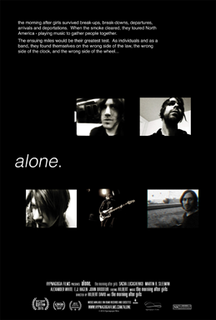
alone. is a 2014 documentary film about the North American tour of the neo-psychedelia band the morning after girls, in support of their LP alone. It was produced by Hilbert David, and directed by Hilbert and the morning after girls. The film showcases music, images and live performances while recounting a novel experience in travel, as band members narrate collective aspirations and motives.

Niobe Thompson is a Canadian anthropologist and documentary film maker. The founder of Handful of Films, he produces and hosts one-off and series documentaries in partnership with CBC's science-and-nature program The Nature of Things. He has won three Canadian Screen Awards for "Best Science and Nature Documentary", his films have won 32 Alberta Film Awards, and he is a two-time winner of the Edmonton Film Prize.

Ski-BASE jumping is the recreational sport of skiing at a high speed off of a cliff or mountain and free-falling through the air, using a parachute to descend to the ground, therefore combining the two sports of skiing and BASE jumping. Participants often perform tricks or manoeuvres during the freefall and remove their skis mid-air in order to safely deploy the parachute and land.

David MacDougall is an American-Australian visual anthropologist, academic, and documentary filmmaker, who is known for his ethnographic film work in Africa, Australia, Europe and India. For much of his career he co-produced and co-directed films with his wife, fellow filmmaker Judith MacDougall. In 1972, his first film, To Live with Herds was awarded the Grand Prix "Venezia Genti" at the Venice Film Festival. He has lived in Australia since 1975, and is currently a professor in the Research School of Humanities & the Arts at Australian National University.

